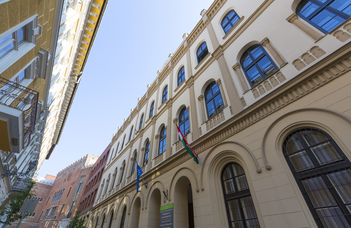History

The history of the faculty
The history of the faculty is quite exciting and goes back a long way. Some of its units and the outstanding workshops organised here in the field of Hungarian pedagogy and psychology have been at the forefront of Hungarian higher education for over a century. The Faculty’s predecessors are the Department of Education of ELTE, founded in 1814, and the former Department of Psychology of Pázmány Péter University. Following in the footsteps of these departments, the pedagogical and psychological training programmes started at ELTE’s Faculty of Humanities.
The Faculty’s home building in Kazinczy Street originally opened in 1873 as a girls’ school. By 1984, the old building was completely rebuilt according to the principles and aesthetic standards of the modern age, and its interior spaces underwent several further renovations and modernisations after ELTE PPK moved in.
In the early 2000s, the university’s governing body created an independent faculty for the disciplines of education, psychology, and sport and health sciences. The integration of the Institute of Psychology and the Department of Education at ELTE’s Faculty of Humanities, as well as of parts of the Faculty of Teacher Training and the ELTE Teacher Training and Development Coordination Centre led to the creation of the Faculty of Education and Psychology, and tuition started here in September 2003. (You can read more about the history of the faculty in PPK’s 10th anniversary volume.)
A further milestone in the history of the faculty was when, in 2017, the Szombathely units of the University of West Hungary, the later Institute of Education and Psychology, and the Institute of Sport Sciences joined the faculty; today, PPK has eight institutes. Since its establishment, PPK has been continuously developing, its training portfolio has been expanding, and the number of students studying here has been growing rapidly: currently, more than 4400 Hungarian and 600 international students are studying here.
Deans of the Faculty of Education and Psychology:
György Hunyady (2003-2007)
Attila Oláh (2007-2010) (2010-2014)
Zsolt Demetrovics (2014-2019) (2019-2021)
Anikó Zsolnai (2021-2025)
Andrea Dúll (2025- )
Topping the rankings
ELTE PPK is consistently ranked among the best in the discipline of psychology in both national and international higher education rankings. According to HVG’s list, ELTE PPK has offered the best education in the fields of humanities and sports science for years. On an international level, the University’s psychology programme made the top 130, which means that PPK is in the world’s top 5% in this respect. As for educational science, PPK is the only Hungarian institution to be ranked in the top 350.
Diverse training portfolio
 The diversity of PPK is most evident in its training portfolio: besides the humanities, the faculty also offers programmes in sports science, natural sciences (computational and cognitive neuroscience), economics (human resource counselling), and the faculty plays a significant role in teacher training as well. PPK’s postgraduate specialist training courses offer opportunities for further development and study in several narrower specialisations.
The diversity of PPK is most evident in its training portfolio: besides the humanities, the faculty also offers programmes in sports science, natural sciences (computational and cognitive neuroscience), economics (human resource counselling), and the faculty plays a significant role in teacher training as well. PPK’s postgraduate specialist training courses offer opportunities for further development and study in several narrower specialisations.
From the very beginning, the faculty has also placed great emphasis on English-language programmes, with nine different training programmes currently taught in English. The number of international students at PPK has been rising dynamically since 2010: while more than 200 foreign students came to study at PPK in 2014, by 2024 more than 600 were enrolled in international programmes.
Outstanding research activities
Besides teaching, research also plays a prominent role at the Faculty of Education and Psychology. A large number of faculty members and students participate in international as well as national projects, while around half a hundred research groups from several institutes carry out valuable work and publish their results in renowned journals.
The laboratories at ELTE PPK, which are unique on a national level, function as important research centres: the ELTE Baby Lab, the Budapest Laboratory of Sleep and Cognition, or the Mészáros János Applied Exercise Physiology Research Group use professional equipment to carry out their tests, which are ultimately useful for the whole society.
The faculty publishes several internationally ranked journals; the Journal of Behavioral Addictions, for instance, is the highest ranked Hungarian scientific journal in the Central European region.
Third mission
In addition to offering bachelor’s, master’s and doctoral programmes, as well as postgraduate specialist training courses, the faculty also contributes to the training and service activities of the University itself in the areas of counselling and life management services as well as physical education and sport.
One of the most important elements of the faculty’s social engagement is the “University of the Third Age, ELTE – for active ageing” senior academy programme, supported by the district government, which aims to provide learning opportunities for the elderly through open lectures and seminars. Since 2013, ELTE PPK’s Department of Clinical Psychology and Addiction runs a Gambling Helpline, which provides anonymous and confidential support for the treatment of problems related to gambling and video game addiction.

